|
|
|
Sort Order |
|
|
|
Items / Page
|
|
|
|
|
|
|
| Srl | Item |
| 1 |
ID:
120144
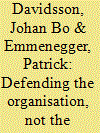

|
|
|
|
|
| Publication |
2013.
|
| Summary/Abstract |
European labour markets are often described as rigid with comparatively high levels of job protection that do not allow for the flexible adjustment of employment to economic fluctuations. This interpretation overlooks important sources of flexibility, however. Research has shown that recent labour market policy reforms have allowed for the creation of two-tier labour markets consisting of insiders in standard employment relationships and outsiders in non-standard employment. This outcome has typically been explained by pointing to the representational interests of unions or social-democratic parties. It has been argued that rather than protecting all labour market participants, unions and social-democratic parties focus on the interests of their members and their core constituency, respectively, most of whom are in standard employment relationships. In contrast, it is argued here that unions' institutional power resources are the crucial variable explaining this outcome. In difficult economic times, when unions are asked to make concessions, they will assent to labour market reforms, but only to those that do not fundamentally threaten to undermine their organisational interests. In the context of job security legislation, this means that unions defend the protection of permanent contracts while they compromise on the regulation of temporary employment. This 'second best solution' allows them to protect their organisational interests, both by retaining their institutional role in the administration of dismissals and by living up to their institutional role as one of the organisations responsible for the direction of labour market policy reform. Using fsQCA this article shows that unions' institutional power resources are more apt to explain the observed two-tier reform pattern than the unions' or the social-democratic parties' representational interests.
|
|
|
|
|
|
|
|
|
|
|
|
|
|
|
|
| 2 |
ID:
157935
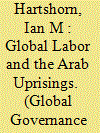

|
|
|
|
|
| Summary/Abstract |
International institutions, including the transnational advocacy network for labor and workers' issues, can influence labor institutions during transitions to and from democracy. Through rhetorical and material support, these institutions can shape labor's relationship to the state. This article addresses the activities of “global labor” in the recent transitions in Tunisia and Egypt, arguing that divergent strategies shaped incentives, expectations, and outcomes among workers and labor unions in each country.
|
|
|
|
|
|
|
|
|
|
|
|
|
|
|
|
| 3 |
ID:
085012
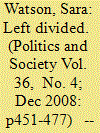

|
|
|
|
|
| Publication |
2008.
|
| Summary/Abstract |
This article challenges dominant explanations in the comparative political economy literature on the origins and purposes of social protection. Far from being a tool of working-class mobilization, social protection in southern Spain was strategically employed by a left party to politically demobilize its supposedly "natural" constituencies. This peculiar outcome is the result of a setting that is common in welfare states outside of northern Europe: the context of a divided left, in which parties and unions are seeking to mobilize different constituencies and in which left parties are themselves divided between moderate and far-left groups. The result in Spain was that social policy became a weapon in parties' efforts to undermine their political competition. This suggests the need to rethink the received wisdom about what the welfare state does to build working-class power in the context of a divided left
|
|
|
|
|
|
|
|
|
|
|
|
|
|
|
|
| 4 |
ID:
108799
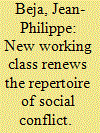

|
|
|
| 5 |
ID:
077448
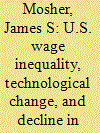

|
|
|
|
|
| Publication |
2007.
|
| Summary/Abstract |
Wage inequality, including the college/high school education premium, has increased substantially in the United States. A key part of the most widely accepted explanation for this is that skill-biased technological change accelerated during this time. This article suggests that the impact of skill-biased technological change was closer to constant in the second half of the twentieth century. This leaves a large unexplained decrease in the college/high school education premium in the 1940s and a large unexplained increase in the 1980s. The current article provides evidence that the upsurge and decline in union power during those respective periods provide a good explanation for these unexplained wage inequality changes.
|
|
|
|
|
|
|
|
|
|
|
|
|
|
|
|
| 6 |
ID:
093854
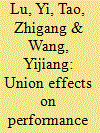

|
|
|
|
|
| Publication |
2010.
|
| Summary/Abstract |
This paper empirically studies union effects on the performance of, and employment relations in, China's private enterprises. The study finds a positive and statistically significant union effect on labor productivity, but not on profitability. It further finds that unions lead to better employee benefits and increased contract signing in employment. These findings suggest that, in the era of transition from a centrally planned to a market economy, unions in China's private enterprises do promote workers' interests as unions do in other economies. And they do that without abandoning their traditional role of harmonizing employment relations, as required by the Party.
|
|
|
|
|
|
|
|
|
|
|
|
|
|
|
|
| 7 |
ID:
110257
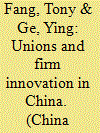

|
|
|
|
|
| Publication |
2012.
|
| Summary/Abstract |
The 'monopoly face' of unions suggests that the rent-seeking activities of unions discourage research and development investment and that the collective bargaining rules may restrict management flexibility, thus deterring innovations. On the other hand, the arrival of unions in the workplace may 'shock' the management into adopting more systematic rather than ad hoc management practices and that such innovative workplace practices may enhance an organization's ability to introduce new products and/or new processes. Further, the 'voice face' of unions argues that the independent 'questioning' of the management deliberations by the unions can also lead to better, more creative and, hence, more productive solutions. This paper investigates the link between unions and firm innovations in China. Different from their counterparts in advanced economies, Chinese unions are found to encourage firm innovations and R&D investment.
|
|
|
|
|
|
|
|
|
|
|
|
|
|
|
|
| 8 |
ID:
108921
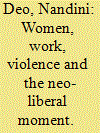

|
|
|
|
|
| Publication |
2011.
|
| Summary/Abstract |
One of the surprising effects of neo-liberalism has been to shift progressive politics away from labour organizing towards NGO-led campaigns against social harms. Reading labour histories and feminist histories together, it is argued that the new politics of resistance needs a new language which combines broad feminist analysis with grassroots labour organizing strategies.
|
|
|
|
|
|
|
|
|
|
|
|
|
|
|
|
|
|
|
|
|